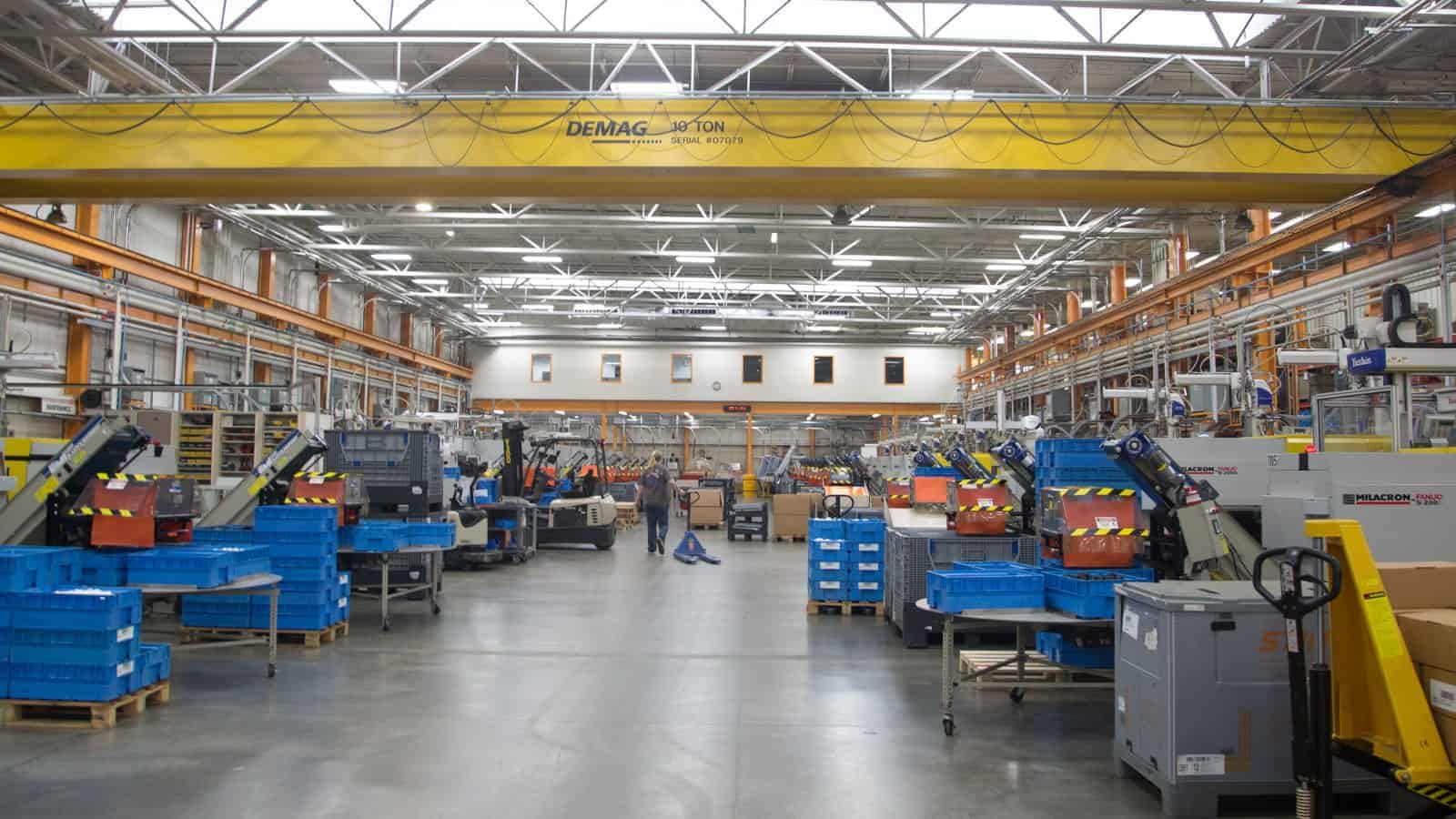NAM, Allies Urge Court to Vacate PFAS Rule
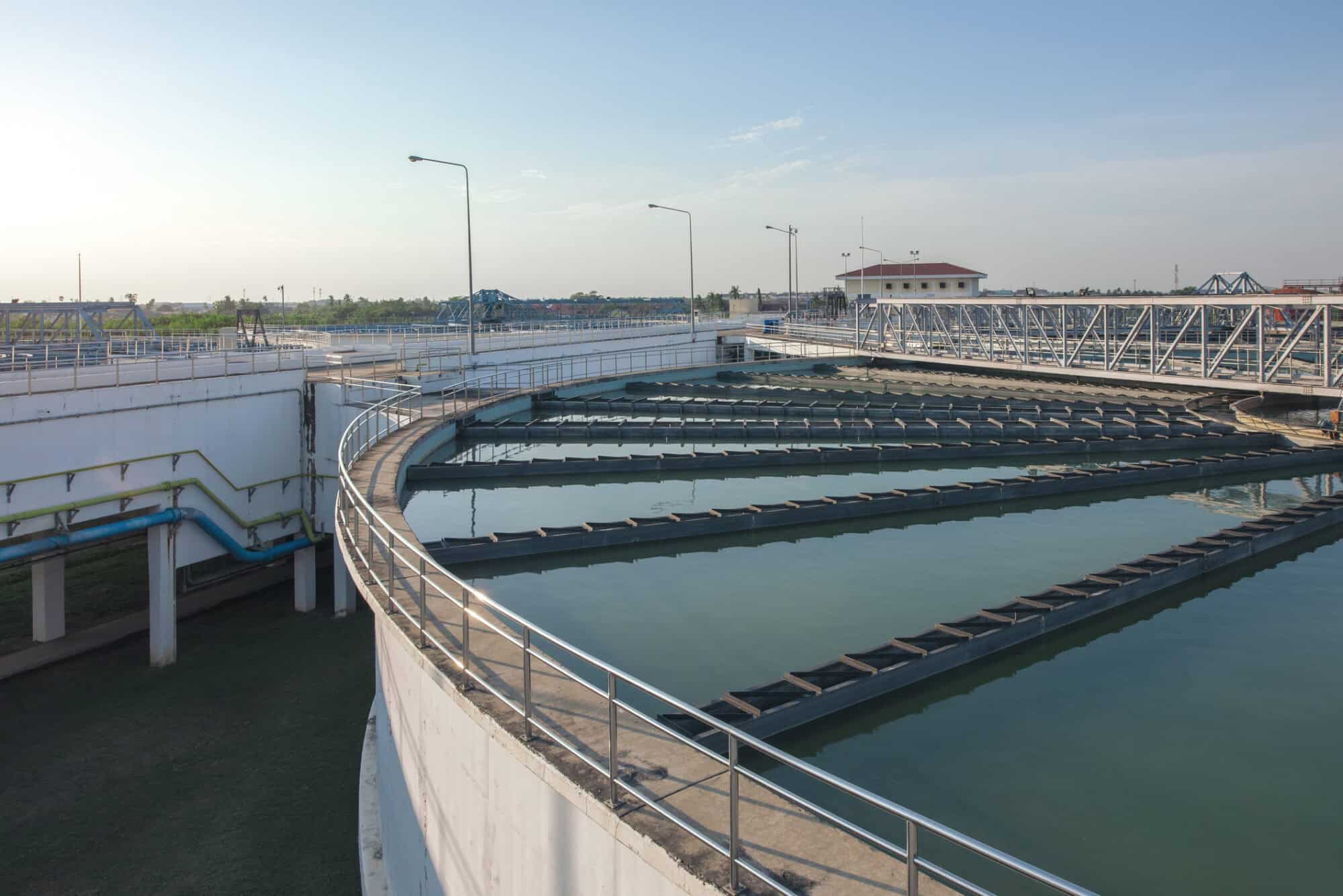
The EPA’s final rule setting national drinking water standards for PFAS should be vacated in its entirety, the NAM and two allies said in an opening brief filed in federal court Monday.
What’s going on: The NAM, the American Chemistry Council and U.S. chemical company Chemours asked the U.S. Court of Appeals for the D.C. Circuit to overturn the EPA’s rule, announced in April, which requires that municipal water systems nationwide remove six types of per- and polyfluoroalkyl substances from drinking water. Trade groups representing the water systems have also sued to overturn the rule.
The grounds: The rule is unlawful and must be set aside for the following reasons:
- The EPA used a deeply flawed cost-benefit analysis to justify the rule.
- The EPA conducted a woefully incomplete feasibility analysis that ignores whether the technology and facilities necessary for compliance actually exist.
- Critical parts of the rule exceed the agency’s statutory authority under the Safe Drinking Water Act and flout the act’s express procedural requirements.
- The EPA failed to consider reasonable alternatives or respond meaningfully to public comments that undercut its judgment.
- The agency “lacked sufficient data to regulate” HFPO-DA, one of the PFAS chemicals that falls under the rule.
Why it’s important: PFAS “are substances at the center of modern innovation and sustain many common technologies including semiconductors, telecommunications, defense systems, life-saving therapeutics and renewable energy sources,” according to the brief.
- The NAM and its co-petitioners “support rational regulation of PFAS that allows manufacturers to continue supporting critical industries, while developing new chemistries and minimizing any potential environmental impacts. But that requires a measured and evidence-based approach that the [r]ule lacks.”
What’s next: Briefing in this case will continue through the spring, with oral argument to follow and a decision from the D.C. Circuit expected in late 2025.
NAM-Supported Bills Clear House Committee
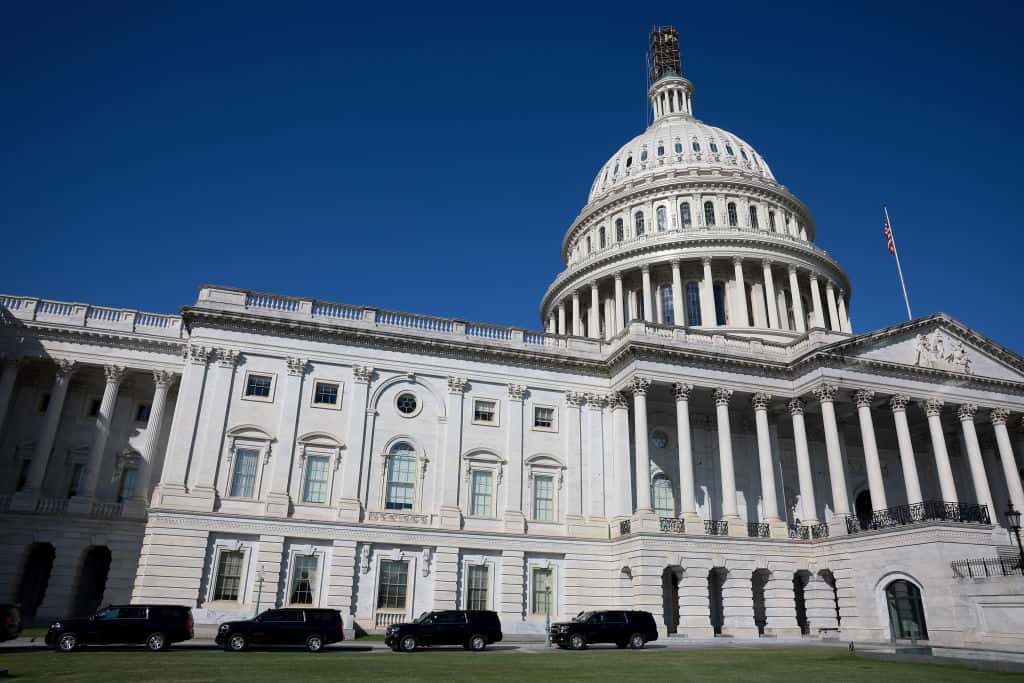
The NAM this week advocated the passage of two pieces of manufacturing-critical legislation, successfully driving the agenda of a Wednesday House Energy and Commerce Committee markup.
What’s going on: The committee—with the NAM’s strong support—approved two bills that address longstanding manufacturing priorities:
- A congressional resolution disapproving of the Environmental Protection Agency’s harmful PM2.5 rule
- A bill instituting important pharmacy benefit manager reforms
Reversing an unworkable PM2.5 standard: The EPA announced a new, more restrictive particulate matter standard in February, reducing allowable levels from 12 micrograms per cubic meter of air to 9 micrograms—despite a standard of 9 being “essentially background levels in some of the country,” as the NAM has pointed out.
- “Manufacturers have sharply reduced particulate matter emissions, or PM2.5; as a result, industry in the United States has some of the cleanest and most efficient operations in the world,” NAM Vice President of Domestic Policy Chris Phalen told the committee.
- “Now, the vast majority of emissions are from sources well outside of our control, with fires, dirt roads and other nonpoint sources accounting for 84% of PM2.5 emissions,” Phalen continued. “[T]he EPA’s rule will make it more difficult for states to issue permits for the construction of new facilities or expansions of existing factories.”
- The committee’s PM2.5 resolution, offered under the Congressional Review Act, seeks to overturn the EPA’s unworkable standard.
Reforming PBMs: PBMs are unregulated middlemen whose business practices drive up health care costs for manufacturers and manufacturing workers.
- “By applying upward pressure to list prices that dictate what patients pay at the pharmacy counter, pocketing manufacturer rebates and failing to provide an appropriate level of transparency about their business practices, PBMs increase health care costs at the expense of all patients in America,” NAM Vice President of Domestic Policy Charles Crain said.
- Provisions in the NAM-supported Telehealth Modernization Act would increase transparency into PBMs’ business practices and delink their compensation from medicines’ list prices.
The last word: “Manufacturers commend the Energy and Commerce Committee for approving these important bills, which will reduce costs and enhance growth at manufacturers across the country—allowing our industry to continue to create jobs here at home and drive U.S. competitiveness on the world stage,” said NAM Managing Vice President of Policy Chris Netram.
Techmer PM Offers Safe Alternatives to PFAS for Manufacturers
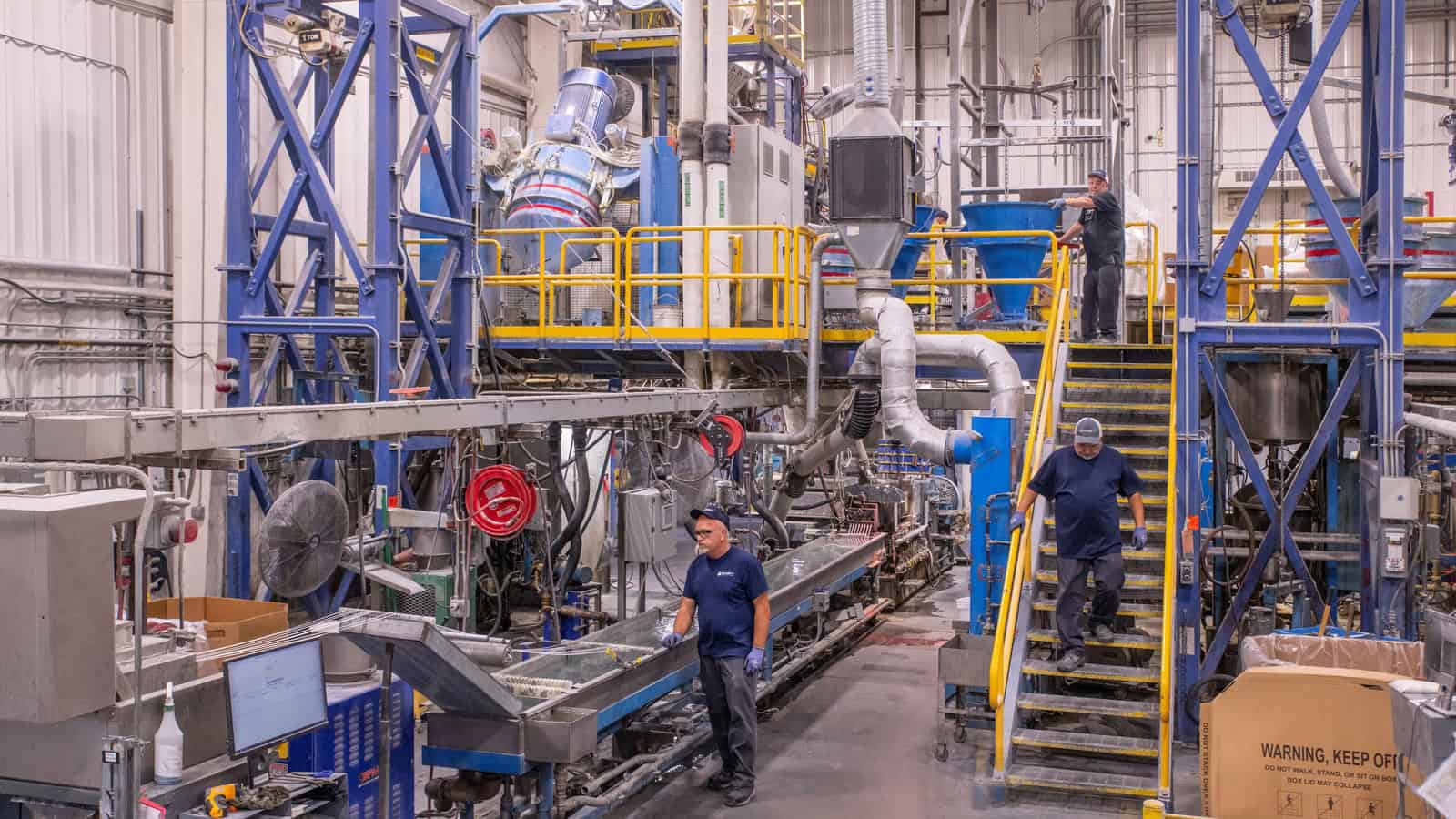
The search for alternatives to chemicals called PFAS has been going on for years. Recently, materials design company Techmer PM created one—a new chemical for use in polymer processing.
The new solution: Last year, the Clinton, Tennessee–based manufacturer introduced the HiTerra T5—a polymer processing aid that helps maintain film surface smoothness and die-lip buildup—which replaces traditional chemistry based on per- and polyfluoroalkyl substances.
- The HiTerra T5, which meets Environmental Protection Agency guidelines and does not interfere with other additives, is being used in large-scale commercial undertakings by Techmer PM customers.
Why it’s critical: In March, the EPA issued the first federal reporting limits and guidelines for tracking the use of PFAS in manufacturing, along with other PFAS-related regulations. Individual states are also imposing their own restrictions on PFAS chemicals.
- The current regulatory environment is motivating plastics processors and raw materials suppliers to seek new alternatives to this chemistry.
- “The biggest challenge is that fluorinated chemistry is excellent at reducing friction, reducing melt fracture, improving hydrophobicity, stain resistance and helping the processing that manufacturers use, for example, to make film,” Techmer PM CEO Mike McHenry told the NAM in a recent interview. “It also helps with wear on small gears. It’s very effective, and it has unique properties that customers are accustomed to.”
More replacement efforts: Techmer PM is working closely with its customers to come up with additional PFAS alternatives, McHenry said.
- Because one of PFAS’ most useful characteristics is its ability to resist fire, “we’re looking at ways to remove halogen flame retardants, including fluorinated compounds” and find a comparable alternative for customers, McHenry said.
Unrealistic timelines: While the firm is hard at work developing potential replacements, the stringent deadlines that the EPA has set for the reporting and potential elimination is damaging, McHenry told us.
- “It can take years to get use approval [for alternatives], and finding them is a huge challenge in itself,” he went on. “We see the timelines being put forth as something that needs to be looked at, and [manufacturers] need support.”
- “For some uses—tubing, for example–it’s going to be very difficult to find something that will work the way fluorinated chemistries do. As much as we all want to move away from [PFAS], there are some instances in which it will be worse” to rush the search than continue using PFAS, he added.
- One of these areas is medical devices, McHenry said. The gowns used to protect surgeons and nurses, for example, are coated in PFAS-containing substances, which “will be very difficult to replace.”
The long view: For many applications, dependable alternatives will likely be found at some point, McHenry concluded.
- “I think we’ll find alternatives, but it’s not one-size-fits-all, and it will take time,” he said. “The versatility of fluorinated compounds is unique.”
Rep. Garbarino, NAM Talk CIRCIA Flaws
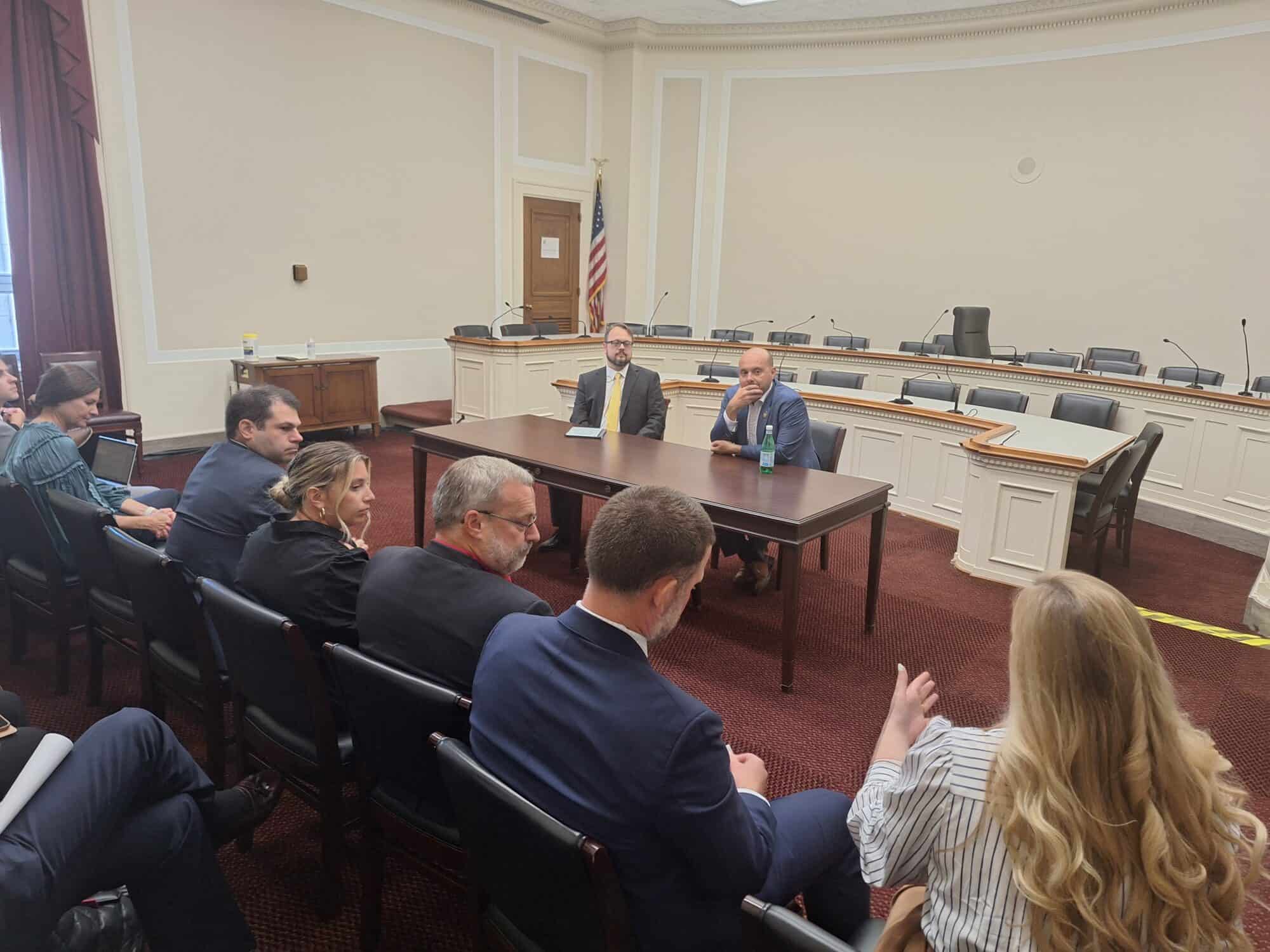
A draft Department of Homeland Security rule requiring that certain sectors expedite cyber-incident reporting has several shortcomings that must be addressed before the rule becomes final in the fall of 2025, the NAM told Rep. Andrew Garbarino (R-NY) in a meeting this week.
What’s going on: Rep. Garbarino, chair of the House Homeland Security Subcommittee on Cybersecurity and Infrastructure Protection, met with manufacturers and the NAM Technology Policy Committee Tuesday to talk cybersecurity issues.
- Much of the discussion focused on draft rulemaking published in April by the DHS’s Cybersecurity and Infrastructure Security Agency. It would require “covered entities” in “critical infrastructure sector[s]” to report any major cybersecurity incidents to CISA within 72 hours.
- Under the Cybersecurity Incident Reporting for Critical Infrastructure Act, CISA must finalize the rule by October 2025.
Why it’s a problem: The NAM agrees with the concerns Rep. Garbarino raised with CISA, including:
- The burden associated with imposing onerous reporting mandates on companies recovering from cyberattacks;
- An overbroad scope, which forces into compliance both organizations that are not truly “critical infrastructure” and those that are too small to have the resources needed to complete the required actions;
- An overbroad definition of incidents requiring reporting;
- An excessive amount of required information;
- An unreasonably high cost of compliance and the diversion of resources away from cyber-incident response; and
- The risk that the proposed rule will jeopardize CISA’s role as a trusted partner of industry.
NAM in action: The NAM submitted comments in response to CISA’s proposal earlier this year outlining these concerns, as well as calling for a reduction in both the number of entities required to file incident notifications and the number of incidents they have to report.
The NAM says: “CISA needs to significantly rethink its approach to CIRCIA’s implementation,” said NAM Senior Director of Technology Policy Franck Journoud.
- “The proposed rule requires far too much information about far too many incidents from far too many companies. CISA should not mandate that companies under attack from hackers divert precious security resources to generate mountains of incident data that CISA will not have the means to process or act upon.”
Take precautions: If you are looking to strengthen your company’s cyber protections, check out NAM Cyber Cover, an affordable, broad security program for NAM members that provides proactive monitoring with automated alerts at no extra cost.
Curb Proxy Firms, NAM Tells Congress
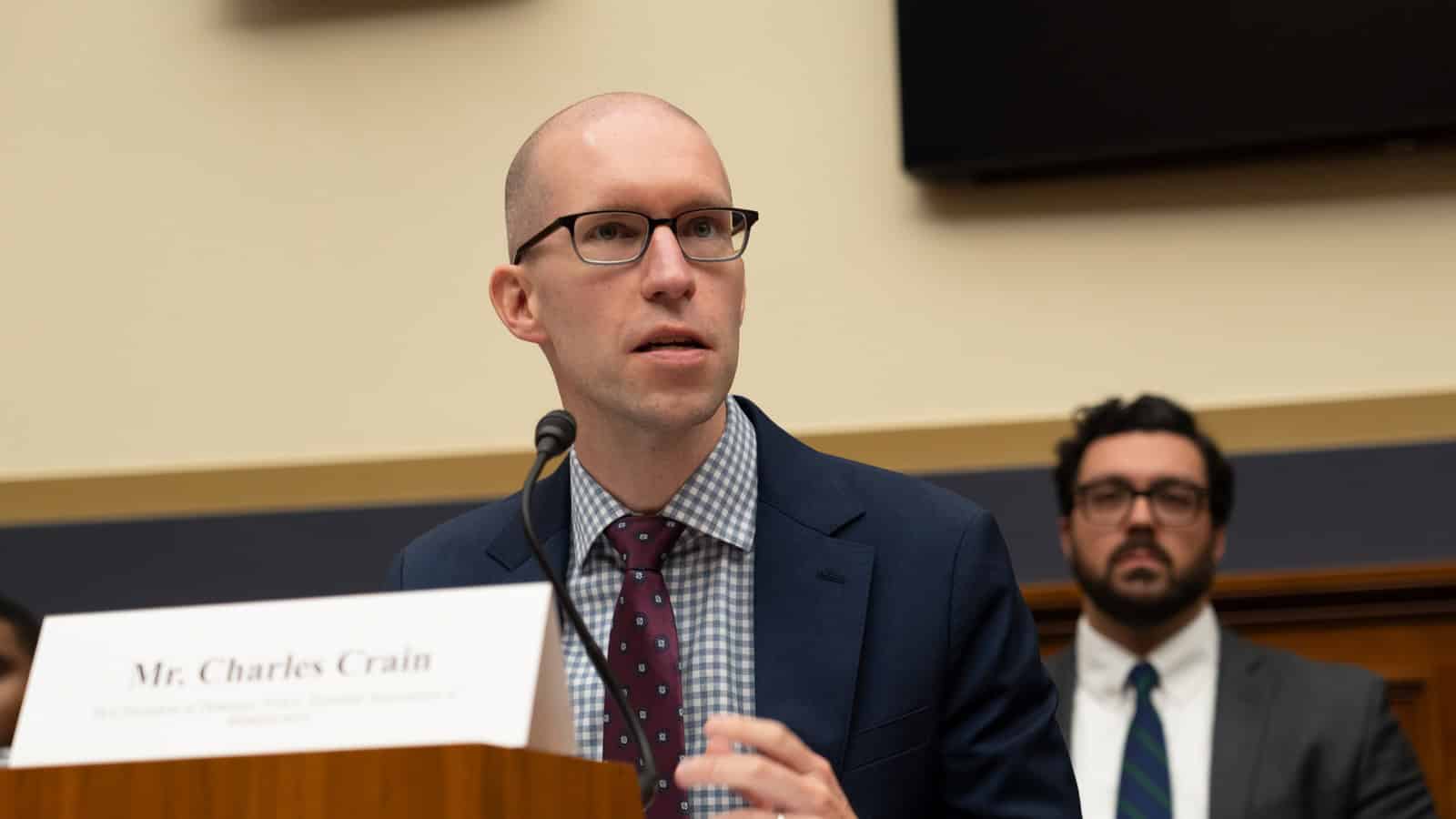
Less than three months after scoring a significant win for manufacturers against Securities and Exchange Commission overreach, the NAM was back in front of Congress to urge regulatory oversight of proxy advisory firms.
What’s going on: On Tuesday, the NAM testified before the House Financial Services Oversight and Investigations Subcommittee on the need to bring oversight and accountability to proxy advisory firms. These are entities that make recommendations regarding the way shareholders should vote on proxy ballot proposals brought before publicly traded companies.
- “Proxy firms are powerful, unaccountable actors that pose a real threat to Americans’ financial security. Manufacturers have been subject to these firms’ outsized influence for far too long,” NAM Vice President of Domestic Policy Charles Crain said during Tuesday’s hearing.
The background: In 2020, the SEC finalized an NAM-supported rule instituting important proxy reforms, such as requiring proxy firms to disclose any conflicts of interest. The NAM has fought in court to preserve the 2020 rule, successfully defeating the SEC’s attempts to suspend the rule and to rescind its most crucial provisions. The NAM is now back in court in a third case, defending the SEC’s authority to regulate these powerful market actors.
Surrendering to ISS: Institutional Shareholder Services Inc., the largest and most influential proxy advisory firm, is now “suing the SEC over its authority to issue the 2020 rule—not just the rule’s particulars, but the SEC’s ability to regulate proxy firms at all,” Crain continued.
- Troublingly, “the SEC is waving the white flag in the face of [the] challenge,” he told lawmakers, referring to the agency’s decision not to appeal after a district court sided with ISS earlier this year.
“Sole defender”: The NAM—now the “sole defender of the 2020 rule”—is appealing the district court’s decision.
What Congress should do: Legislators must take up the mantle, too, Crain concluded.
- “Congress should do what the SEC will not: affirm the SEC’s clear authority, provide much-needed oversight and accountability and help manufacturers and Main Street investors escape the outsized influence of proxy advisory firms.”
NAM to EPA: Reissue Formaldehyde Analysis
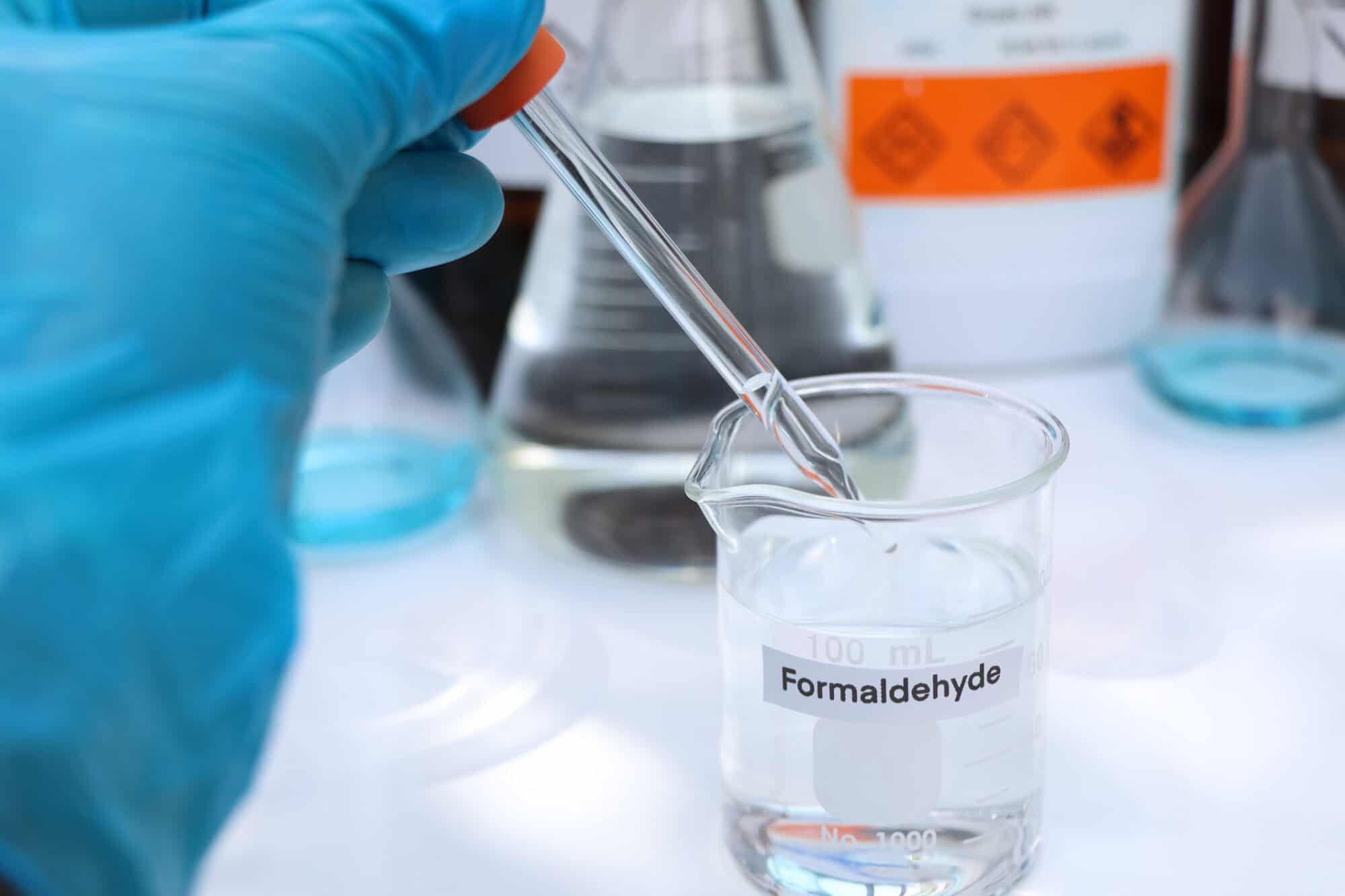
The Environmental Protection Agency’s final formaldehyde analysis—issued in August and set to inform future regulations—risks “creat[ing] an unachievable standard and a de facto ban” on an essential manufacturing material, the NAM said.
What’s going on: On Aug. 20, the EPA’s research office issued its conclusions about the “amount of the chemical that could be harmful” to humans, saying that “[s]mall amounts … can increase people’s risk of [health] problems” (Bloomberg Law, subscription).
- Though the report itself does not mandate any new restrictions on the industry, the EPA is likely to use the findings to take the next step in the regulatory process—a final risk evaluation—by the end of 2024 (The Hill).
- The assessment maintains the formaldehyde threshold of 11 parts per billion proposed by the agency in 2022. That’s 30 times lower than Europe’s recently updated worker-exposure limit of 300 parts per billion and “lower than what can be found in homes or even background levels for outdoor air,” the NAM told the EPA.
Why it’s a problem: Formaldehyde is used widely across industries to produce numerous everyday items, including plastics, lubricants, automotive parts, fertilizers, adhesives and more.
- The final analysis, which was released without review by the EPA’s own Science Advisory Committee on Chemicals, fails to account for “the highly developed safety procedures, protocols and [personal protective equipment] used throughout [the manufacturing] industry.”
- A severe restriction on the allowable workplace threshold of formaldehyde “could wreak havoc on domestic supply chains,” according to the NAM.
What should be done: The EPA should reissue its risk evaluation to give the SACC an opportunity to review it and provide comments—“and allow for additional public comment after the SACC review is complete,” the NAM concluded.
NAM Launches Ad Campaign for PBM Reform

The NAM has launched a new wave of ads in D.C. and nine states, extending its seven-figure campaign urging policymakers to reign in pharmacy benefit managers, underregulated middlemen who drive up the costs of prescription medications for manufacturers and manufacturing workers.
A quick refresher: PBMs sit in the middle of the health care industry, negotiating with employer health plans, insurers, biopharmaceutical manufacturers, pharmacies and other players to determine what prescriptions employees can access and what they pay for them. While their job is ostensibly to reduce the costs of medicines, often they do the exact opposite.
- PBMs have been found to steer patients toward pricier options, inflict steep mark-ups and hidden fees and even pocket large portions of the rebates that biopharmaceutical manufacturers intend for American workers and their families.
NAM in action: The NAM has been a staunch voice supporting PBM reform on Capitol Hill, recently laying out manufacturers’ concerns for the House Committee on Oversight and Accountability.
- The committee conducted its third hearing on PBM overreach in July, when it also released a highly critical report on PBMs that echoed many of the NAM’s concerns.
- In addition, the NAM is supporting several key measures to increase oversight of PBMs’ business models and reform their pricing strategies, including the DRUG Act and the PBM transparency provisions in the Lower Costs, More Transparency Act.
What Congress should do: The NAM is advocating for three major reforms to the PBM system, including:
- Increasing transparency in PBMs’ business models, including how their compensation influences health care decisions and how their policies dictate a medicine’s cost and formulary placement;
- Rebate pass-through, which will ensure health care savings are passed directly to manufacturers and their workers rather than being pocketed by PBMs; and
- Delinking PBMs’ compensation from a medicine’s list price, removing their incentive to put upward pressure on list prices to maximize their own profits.
Benefits for all: The NAM is calling on Congress to enact these reforms in the commercial insurance market, not just in government programs like Medicare and Medicaid, so that all Americans can enjoy lower-cost health care benefits.
What to watch: The NAM is calling on Congress to act on this issue during the lame-duck session following the election.
Manufacturers: EPA’s PFAS Reporting Delay Underscores Massive Administrative Burden
Washington, D.C. – Following the Environmental Protection Agency’s decision to delay the deadline for when companies must submit records dating back to 2011 on per- and polyfluoroalkyl substances, otherwise known as PFAS, National Association of Manufacturers Vice President of Domestic Policy Chris Phalen released the following statement:
“We are pleased to see the EPA delay this retroactive reporting requirement—as the NAM has called for—which will temporarily prevent an increase in the regulatory burden facing manufacturers. More broadly, today’s announcement reflects the massive administrative burden this proposal would impose on both the business community and regulators, while failing to provide insights for effective and prioritized public health efforts. We urge the agency to reverse course entirely, unless and until it has the capacity to effectively enforce the standard.”
-NAM-
The National Association of Manufacturers is the largest manufacturing association in the United States, representing small and large manufacturers in every industrial sector and in all 50 states. Manufacturing employs nearly 13 million men and women, contributes $2.87 trillion to the U.S. economy annually and accounts for 53% of private-sector research and development. The NAM is the powerful voice of the manufacturing community and the leading advocate for a policy agenda that helps manufacturers compete in the global economy and create jobs across the United States. For more information about the NAM or to follow us on Twitter and Facebook, please visit www.nam.org.
Why Congress Should Cook Up a New MTB

Kitchens across America are missing a key ingredient: a new Miscellaneous Tariff Bill.
What’s going on: SCHOTT North America—a subsidiary of the German specialty glass, glass ceramics and high-tech material manufacturer—produces CERAN glass-ceramic cooktops at its facility in Vincennes, Indiana, where it employs more than 140 workers.
- To manufacture the cooktops in Indiana, the company must first import “green glass”—the glass-ceramic material that is refined and finished for use in appliances—which is not available in the U.S.
- However, heavy import tariffs on green glass make it much costlier for SCHOTT to manufacture these cooktops in the U.S., while fully processed cooktop panels that are finished abroad and then imported are not taxed.
That’s why the NAM is calling on Congress to pass a new MTB as soon as possible. Trade policies should help companies in the United States become more competitive, not less.
What’s the MTB? The MTB temporarily eliminates or reduces tariffs on more than 1,500 different products not available in the U.S. Congress typically renews the MTB every few years with bipartisan support, but the last MTB expired in December 2020, increasing costs for manufacturers nationwide.
- For SCHOTT North America, the MTB’s expiration has led to significantly higher costs for the past three-and-a-half years.
Action needed: To help SCHOTT and other manufacturers in the same predicament, the NAM has been urging lawmakers to pass the Miscellaneous Tariff Bill Reform Act, which would renew the MTB through the end of 2025 and offer retroactive duty relief back to the beginning of 2021.
- Since the lapse of the last MTB, manufacturers have paid more than $1.5 billion to get materials they cannot source in the U.S., according to an NAM analysis.
- While SCHOTT North America has maintained its workforce at the Vincennes site, these growing costs have interfered with the company’s plans for expansion.
- “We employ about 140 people at the site to process green glass, but the potential is there to hire more and do more” if an MTB were in place, said Tim Kiger, general manager for SCHOTT North America in Indiana.
No other options: Melting the specialty glass in the U.S. isn’t an option at this time, according to Jim Purcell, SCHOTT North America’s international trade compliance manager.
- “Producing green glass here in the United States would be incredibly expensive and technically difficult to do,” he said. “To build a melting operation in the U.S. would take a long time.”
A voice in Congress: Back in October, Rep. Larry Bucshon (R-IN), whose district is home to the Vincennes facility, urged colleagues in the House Ways and Means Committee to advance a new MTB in the name of fairness.
- “The MTB ensures that American producers like SCHOTT are not penalized for importing inputs that are not produced in the United States, and levels the playing field against similar finished products being imported from China,” said Rep. Bucshon.
The last word: SCHOTT North America hopes that the MTB legislation, which is sitting in the House, will soon be enacted.
- The financial relief offered by a new MTB “would be almost immediate,” Kiger said.
- Added Purcell, “The MTB is a good mechanism to … conserve savings. In the global market right now, any cost savings helps you stay competitive.”
Timmons: Industry Resilient, but Action Needed
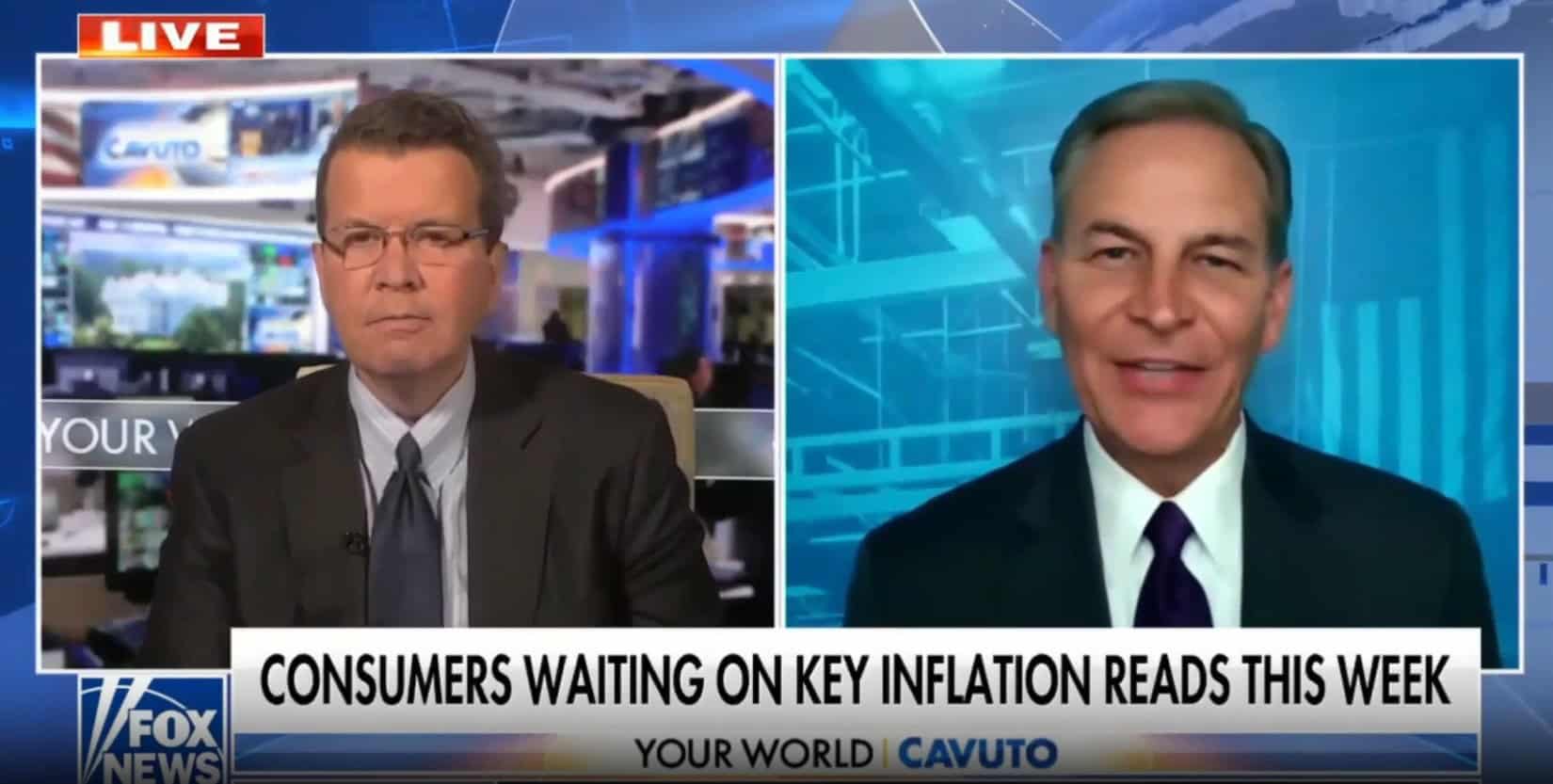
Despite mixed market signals in recent weeks, the U.S. economy is strong and manufacturing is resilient—but Congress must take certain steps to maintain the industry’s competitiveness, NAM President and CEO Jay Timmons told Fox News host Neil Cavuto Monday.
What’s going on: When lawmakers return from their August recess next month, they should prioritize several tax provisions, Timmons said.
- “When … Congress goes back, we’ve got to deal with interest deductibility, and we’ve got to deal with the research-and-development tax deduction,” he continued. “We’ve got to deal with full expensing. Those are things that have expired.” These measures and others are top priorities in the NAM’s tax campaign, Manufacturing Wins.
- Other manufacturing-critical tax provisions are scheduled to expire or be reduced drastically at the end of next year, including the pass-through and estate-tax deductions. What’s more, “candidates on both sides of the aisle … are talking about raising taxes on businesses,” Timmons said. Individual tax rates and tax rates on manufacturers that operate globally are also set to rise at the end of 2025.
Regulatory onslaught: Manufacturers are also struggling with a “regulatory burden that is driving up the cost of doing business,” Timmons told Fox News.
- “We have restrictions on our ability to develop energy sources here, and we have a ban on exports of natural gas. All of those things lead to potential downsides in the economy.”
- The vast majority of Americans support exporting natural gas, a March NAM poll found, but the Biden administration’s indefinite pause on permits to export liquefied natural gas, imposed in January, continues.
Hopeful outlook: “There is a … very positive sense among manufacturers that if we do the right things on the policy front, we’re going to continue [the] expansion in the sector,” Timmons added. “We’re going to continue the record investments that we’ve seen, the record job growth and the record wage growth in the sector.”
